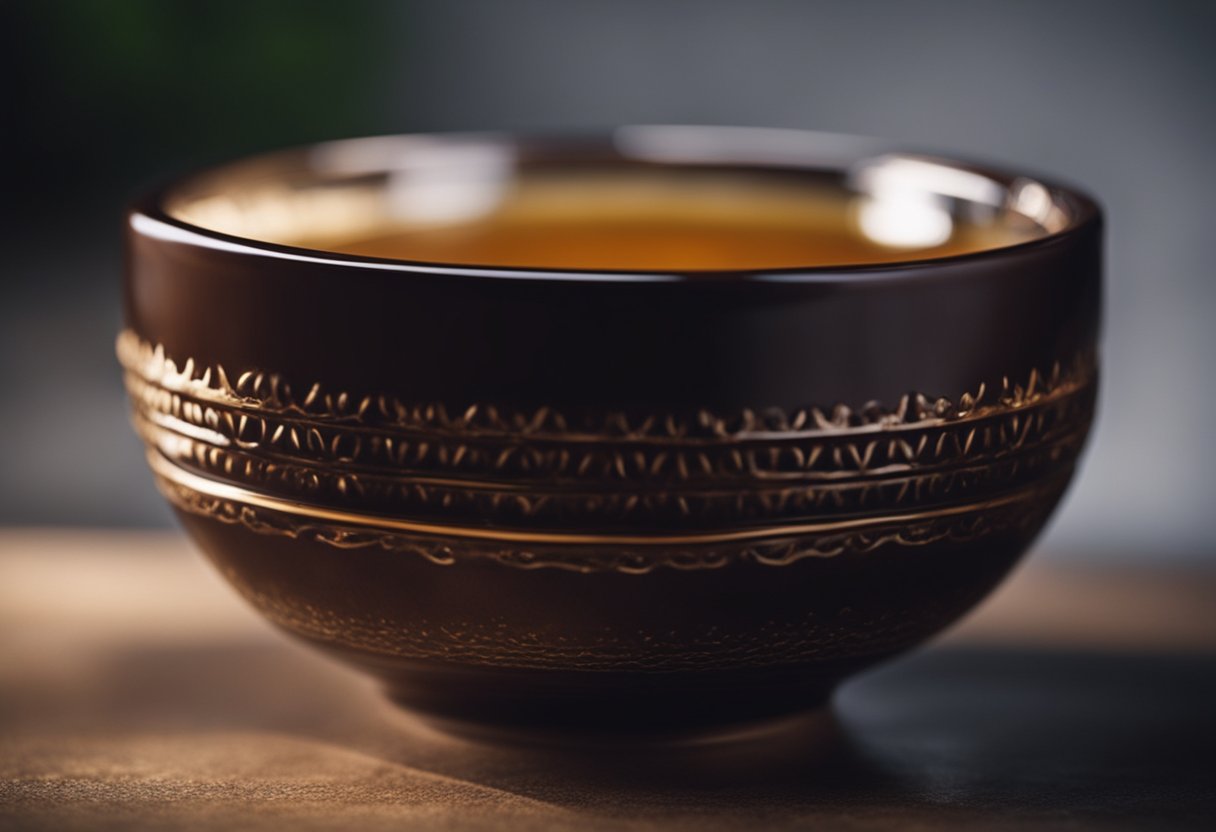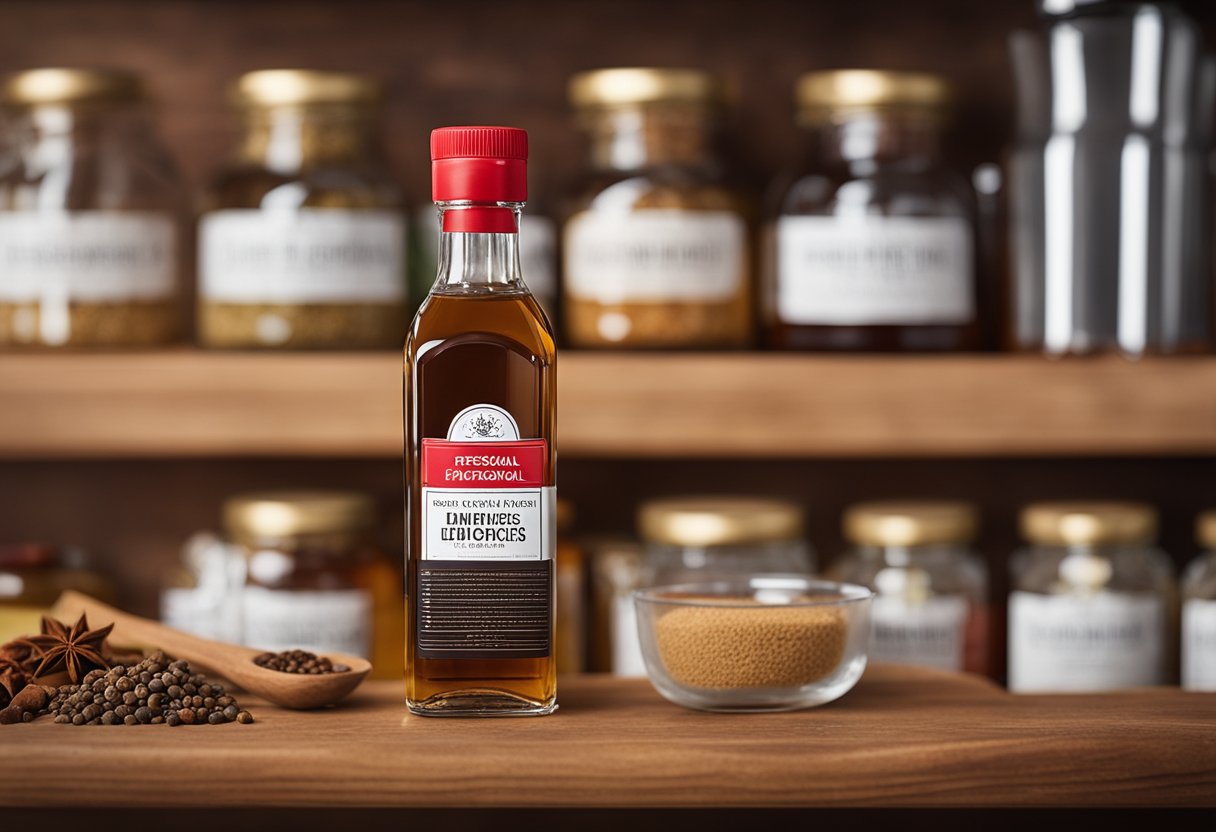Fish sauce is an essential ingredient in many Southeast Asian cuisines, particularly Thai and Vietnamese.
It has a unique taste profile that adds depth and complexity to dishes, making it a popular condiment for many recipes. But what does fish sauce taste like, and why is it so versatile?

Fish sauce is made from fermented fish and salt, which gives it a pungent aroma and a salty, savory taste. It has a rich umami flavor, with hints of sweetness and tanginess that make it a popular ingredient in marinades, stir-fries, and dipping sauces.
While some may find its distinct smell and taste overpowering, it is a staple in many kitchens around the world.
Understanding the taste profile of fish sauce is crucial for anyone who wants to cook with it. From the ingredients and fermentation process to the different variations and brands available, there is much to learn about this unique condiment.
In this article, I will explore what fish sauce tastes like, how to use it in cooking, and its nutritional benefits.
Key Takeaways
- Fish sauce is a fermented condiment made from fish and salt that has a pungent aroma and a salty, savory taste.
- It has a rich umami flavor with hints of sweetness and tanginess that make it a versatile ingredient in many cuisines.
- Understanding the taste profile of fish sauce is crucial for anyone who wants to cook with it, and there is much to learn about its ingredients, fermentation process, and culinary uses.
Understanding Fish Sauce

Fish sauce is a condiment that is commonly used in Southeast Asian cuisine. It is made by fermenting fish with salt, and the result is a salty, savory liquid that is used as a flavoring agent in a wide variety of dishes.
Fish sauce has been used in Southeast Asian cuisine for thousands of years, and it is an essential ingredient in many dishes. It is commonly used in Thai, Vietnamese, and Filipino cuisine, among others.
The fermentation process that is used to make fish sauce is what gives it its unique flavor. During the fermentation process, the proteins in the fish break down into amino acids, which give the sauce its savory, umami flavor.
The longer the fermentation process, the stronger the flavor of the fish sauce.
Fish sauce is a versatile condiment that can be used in a variety of ways. It can be used as a marinade for meats, as a flavoring agent in soups and stews, or as a dipping sauce for vegetables and spring rolls.
When using fish sauce, it is important to use it sparingly, as it is a very potent flavoring agent. A little bit goes a long way, and it is easy to overpower a dish with too much fish sauce.
Overall, fish sauce is an essential ingredient in Southeast Asian cuisine, and it is a condiment that is worth exploring if you are interested in trying new flavors and cuisines.
Its unique flavor and versatility make it a favorite among chefs and home cooks alike.
The Taste Profile of Fish Sauce

Fish sauce is a popular condiment in Southeast Asian cuisine and is known for its unique taste profile.
As a chef, I have worked with fish sauce in many dishes, and I can confidently say that it has a distinct flavor that enhances the taste of any dish it is added to.
The taste of fish sauce is primarily salty and savory, with a hint of sweetness. It has a pungent aroma, but the taste is not overpowering. Instead, it adds depth and complexity to the dish, making it more flavorful.
One of the key elements of fish sauce is its umami taste. Umami is the fifth taste, in addition to sweet, sour, salty, and bitter. It is described as a savory, meaty taste that is often found in fermented foods.
Fish sauce is made by fermenting fish and salt, which is why it has a strong umami taste.
The flavor profile of fish sauce is versatile, and it can be used in many different dishes. It is commonly used as a dipping sauce, marinade, or seasoning for soups and stir-fries. It pairs well with meats, seafood, vegetables, and rice.
When using fish sauce in a dish, it is important to use it sparingly. A little goes a long way, and adding too much can overpower the other flavors in the dish.
It is also important to choose a high-quality fish sauce, as the taste can vary depending on the brand.
In summary, fish sauce has a unique taste profile that is salty, savory, and slightly sweet. It has a pungent aroma, but the taste is not overpowering.
The umami taste is a key element, and it adds depth and complexity to the dish. Fish sauce is versatile and can be used in many different dishes, but it should be used sparingly to avoid overpowering other flavors.
Ingredients and Fermentation Process

Fish sauce is a liquid condiment that is made from fish or krill that have been coated in salt and fermented for up to two years.
The most common fish used in making fish sauce are anchovies, herring, and mackerel. The fish are mixed with salt and then packed into barrels to ferment.
The fermentation process is what gives fish sauce its unique flavor and aroma.
The fish sauce fermentation process involves breaking down the fish into a liquid form through hydrolysis. Enzymes in the fish break down the proteins and turn them into amino acids, which produce the umami flavor that fish sauce is known for.
The process also involves the growth of bacteria, which helps to break down the fish and produce lactic acid, which gives fish sauce its sour taste.
The salt used in making fish sauce is an important ingredient, as it not only preserves the fish but also helps to extract the liquid.
The salt draws out the moisture from the fish, which then mixes with the enzymes and bacteria to produce the fish sauce.
After the fish have been fermented for up to two years, the liquid is drained and filtered to remove any solids. The liquid is then bottled and sold as fish sauce.
The longer the fish sauce is aged, the darker and more pungent it becomes.
In summary, fish sauce is made from fermented fish that have been mixed with salt and aged for up to two years.
The fermentation process breaks down the fish into a liquid form through hydrolysis and produces the umami flavor and sour taste that fish sauce is known for.
Salt is an important ingredient, as it preserves the fish and helps to extract the liquid. The longer the fish sauce is aged, the darker and more pungent it becomes.
Fish Sauce in Culinary Use
Fish sauce is a versatile ingredient that is commonly used in Southeast Asian cuisine. It is a staple in Thai, Vietnamese, and Chinese cooking, among others.
The sauce is made by fermenting fish and salt, resulting in a salty and savory flavor that adds depth to any dish.
One of the most popular uses of fish sauce is as a marinade or seasoning for meat. It is commonly used in stir-fries, noodle dishes like pad thai and pho, and stews.
Fish sauce can also be used to marinate chicken, beef, or pork before grilling or roasting. It adds a tangy and earthy flavor to the meat, making it more flavorful and tender.
Fish sauce is also a popular ingredient in salad dressings and dipping sauces. It can be mixed with lime juice, garlic, and chili peppers to create a tangy and spicy dipping sauce for spring rolls or sautéed greens.
It can also be mixed with oil and vinegar to create a flavorful salad dressing.
In addition to its culinary uses, fish sauce is also a common condiment in Southeast Asian cuisine. It is often served alongside noodles, rice, and other dishes as a seasoning or dipping sauce.
Fish sauce can also be added to soups and broths to enhance their flavor.
Overall, fish sauce is a versatile and flavorful ingredient that adds depth and complexity to a wide range of dishes.
Its salty and savory taste makes it a popular seasoning for meat, vegetables, and noodles, and it is an essential ingredient in many Southeast Asian dishes.
Variations of Fish Sauce

As with any condiment, fish sauce varies in taste and quality depending on the brand, the country of origin, and the method of production. Here are some of the most common variations of fish sauce:
Vietnamese Fish Sauce
Vietnamese fish sauce, or nuoc mam, is one of the most widely used types of fish sauce. It is typically made from anchovies, salt, and water, and has a clear amber color.
Vietnamese fish sauce is less salty and more nuanced than other varieties, with a slightly sweet and floral undertone. It is often used in Vietnamese cuisine to add depth of flavor to dishes like pho and bun cha.
Thai Fish Sauce
Thai fish sauce, or nam pla, is another popular type of fish sauce. It is made from anchovies, salt, and sugar, and has a sweeter taste than other varieties.
Thai fish sauce is often used in Thai cuisine to add a sweet and savory flavor to dishes like pad thai and green papaya salad.
Filipino Fish Sauce
Filipino fish sauce, or patis, is similar to Vietnamese fish sauce but has a lighter brown hue. It is also made from anchovies, salt, and water, and has a slightly saltier taste than Vietnamese fish sauce.
Filipino fish sauce is often used in Filipino cuisine to add a salty and savory flavor to dishes like adobo and sinigang.
Thai Kitchen Fish Sauce
Thai Kitchen is a popular brand of fish sauce that is widely available in the United States. It is made from anchovies, salt, and sugar, and has a slightly sweet taste.
Thai Kitchen fish sauce is often used in Thai and Vietnamese cuisine to add depth of flavor to dishes like curries and stir-fries.
In conclusion, fish sauce varies in taste depending on the country of origin and the method of production.
Vietnamese fish sauce is less salty and more nuanced, Thai fish sauce is sweeter, Filipino fish sauce is saltier, and Thai Kitchen fish sauce has a slightly sweet taste.
High-Quality Fish Sauce Brands

When it comes to fish sauce, not all brands are created equal. Some brands are simply better than others, offering a more complex flavor profile and a smoother, less pungent taste.
In this section, I will discuss some of the high-quality fish sauce brands that are worth trying.
One of the most versatile and widely available high-quality fish sauce brands is Red Boat. Made in Vietnam, Red Boat fish sauce is known for its rich umami flavor and smooth, well-balanced taste.
It is made using only black anchovies and sea salt, with no added water or preservatives. This results in a pure, high-quality fish sauce that is perfect for use in a wide range of dishes, from stir-fries to marinades to dipping sauces.
Another popular Vietnamese fish sauce brand is Three Crabs. This brand is known for its strong, pungent flavor, which makes it a great choice for dishes that require a bold, assertive taste.
However, some people find Three Crabs to be too strong and overpowering, so it may not be the best choice for those who prefer a milder flavor.
If you’re looking for a high-end fish sauce that is beloved by professional chefs, then you might want to try Red Boat.
This brand is praised for its clean, rounded umami character, which makes it a favorite among culinary experts.
It is also a bit more expensive than other brands, so it may not be the best choice for those on a tight budget.
Overall, there are many high-quality fish sauce brands out there, each with its own unique flavor profile and characteristics.
Whether you prefer a bold, pungent taste or a smoother, more subtle flavor, there is a fish sauce out there that is perfect for your needs.
So don’t be afraid to experiment with different brands and find the one that works best for you.
Health Benefits and Nutritional Content

Fish sauce is a condiment that is commonly used in Southeast Asian cuisine. It is made from fermented fish and salt and has a pungent, salty, and slightly sweet taste.
In addition to enhancing the flavor of dishes, fish sauce also offers several health benefits.
One of the key benefits of fish sauce is that it is rich in amino acids. Amino acids are the building blocks of protein and are essential for the growth and repair of tissues in the body.
Fish sauce is particularly high in glutamic acid, which is responsible for its umami flavor. Glutamic acid is also believed to have a role in reducing inflammation and improving gut health.
Fish sauce is also a good source of vitamin B12, a nutrient that is essential for the health of the nervous system and the production of red blood cells.
Vitamin B12 is found primarily in animal products, so fish sauce can be a good option for people who follow a vegetarian or vegan diet.
In addition to amino acids and vitamin B12, fish sauce also contains other important nutrients such as calcium, iron, and zinc.
These minerals are essential for maintaining strong bones, healthy blood, and a strong immune system.
It is important to note that some brands of fish sauce may contain preservatives such as sodium benzoate or potassium sorbate.
While these preservatives are generally considered safe, some people may be sensitive to them and experience adverse reactions such as headaches or skin irritation.
If you are concerned about preservatives in your fish sauce, look for brands that do not contain them.
Overall, fish sauce is a flavorful condiment that also offers several health benefits. It is a good source of amino acids, vitamin B12, and important minerals, making it a nutritious addition to your diet.
Storage and Shelf Life

As a fermented condiment, fish sauce has a long shelf life and can be stored for a considerable amount of time. Proper storage is important to maintain the quality and flavor of the sauce. Here are some tips on how to store fish sauce:
- Store unopened fish sauce in a cool, dark place like a kitchen cabinet or pantry. It can last for up to two years when stored properly.
- Once opened, fish sauce should be stored in the refrigerator. This will help to preserve its flavor and prevent spoilage. Avoid exposing the sauce to direct sunlight or heat.
- To prevent the sauce from going bad, always use a clean utensil when scooping out the sauce. This will prevent bacteria from contaminating the sauce.
- If you notice any mold growth or a foul smell, it is best to discard the sauce. This indicates that the sauce has gone bad and is no longer safe to consume.
It is important to note that fish sauce may develop sediment over time. This is a natural process and does not indicate spoilage.
To remove the sediment, you can strain the sauce using a fine-mesh strainer or cheesecloth. This will help to ensure that the sauce is smooth and free of any particles.
In summary, proper storage is crucial to maintain the quality and flavor of fish sauce. Always store the sauce in a cool, dark place and refrigerate it once opened.
Use a clean utensil when scooping out the sauce and discard it if you notice any signs of spoilage. If sediment develops, strain the sauce to ensure that it is smooth and free of particles.
Balancing Fish Sauce Flavors
When it comes to using fish sauce in cooking, it’s important to balance the flavors properly. Fish sauce has a distinct flavor that is salty, savory, and slightly sweet.
However, it can also be quite pungent and overpowering if not used correctly. In this section, I will share some tips on how to balance fish sauce flavors to enhance your dishes.
Adding Sweetness
One way to balance the strong flavor of fish sauce is to add sweetness to the dish. Caramel and molasses are great options for adding sweetness to dishes that include fish sauce.
They help to counterbalance the saltiness of the fish sauce and create a more well-rounded flavor.
Adding Tanginess
Tanginess is another way to balance the flavor of fish sauce. Lime juice and vinegar are great options for adding tanginess to dishes that include fish sauce.
They help to cut through the saltiness of the fish sauce and create a more refreshing flavor.
Adding Umami
Fish sauce is already rich in umami flavor, but adding other umami-rich ingredients can help to enhance the flavor even further.
Worcestershire sauce is a great option for adding umami to dishes that include fish sauce. It has a similar savory flavor and can help to complement the fish sauce.
Adding Tamarind
Tamarind is a popular ingredient in Southeast Asian cuisine and is often used in dishes that include fish sauce. It has a tangy and slightly sweet flavor that pairs well with the saltiness of fish sauce.
Tamarind can be used in various forms, including paste, juice, and concentrate.
Adding Ginger
Ginger is another ingredient that pairs well with fish sauce. It has a slightly spicy and pungent flavor that can help to balance the saltiness of the fish sauce.
Ginger can be used fresh or dried, and it can be grated, sliced, or minced depending on the dish.
In conclusion, balancing fish sauce flavors is essential to creating delicious dishes that include this unique ingredient.
By adding sweetness, tanginess, umami, tamarind, or ginger, you can create a well-rounded flavor that complements the saltiness of the fish sauce.
The Distinct Smell of Fish Sauce
As someone who has cooked with fish sauce for years, I can confidently say that the smell of fish sauce is unmistakable.
It has a pungent odor that can be off-putting to some, but it is an essential ingredient in many Southeast Asian dishes.
Fish sauce is made by fermenting fish with salt and water, and the resulting liquid is a dark brown color that is somewhat translucent.
The smell of fish sauce can be described as strong and fishy, but it is important to note that the taste is much milder than the smell.
While some people may find the smell of fish sauce overwhelming, it is important to remember that it is a key ingredient in many dishes and adds a unique depth of flavor that cannot be replicated with other ingredients.
In fact, many people who are hesitant to try fish sauce are often surprised by how much they enjoy the taste once they give it a chance.
It is worth noting that not all fish sauces are created equal. Some brands may have a stronger smell than others, and the quality of the fish used in the fermentation process can also impact the smell and taste of the final product.
It is always a good idea to experiment with different brands and types of fish sauce to find one that you enjoy.
In summary, the smell of fish sauce may be strong and distinct, but it is an essential ingredient in many Southeast Asian dishes and adds a unique depth of flavor.
Don’t let the smell deter you from trying this delicious condiment.
Tenderizing Effect of Fish Sauce
As a chef, I have found that fish sauce not only adds flavor to a dish but also has a tenderizing effect on meat. The reason behind this is the presence of enzymes in fish sauce that break down proteins in meat, making it more tender.
When using fish sauce to tenderize meat, it is important to use it in moderation as it can overpower the flavor of the dish. A good rule of thumb is to use one tablespoon of fish sauce per pound of meat.
It is also important to let the meat marinate in the fish sauce for at least 30 minutes before cooking.
Fish sauce is particularly effective at tenderizing tough cuts of meat such as flank steak, skirt steak, and brisket. It can also be used to tenderize chicken, pork, and seafood.
One way to use fish sauce as a tenderizer is to make a marinade by combining fish sauce, garlic, ginger, and a sweetener such as honey or brown sugar.
This marinade can be used to tenderize and flavor meat before grilling, roasting, or stir-frying.
In summary, fish sauce is not only a flavorful addition to dishes but also has a tenderizing effect on meat due to the enzymes present in it.
When using fish sauce as a tenderizer, it is important to use it in moderation and let the meat marinate in it for at least 30 minutes before cooking.
Fish Sauce vs Other Sauces
When it comes to comparing fish sauce with other sauces, there are a few key differences to consider. Here are some of the main differences between fish sauce and other popular sauces:
Fish Sauce vs Soy Sauce
Fish sauce and soy sauce are both commonly used in Asian cuisine, but they have distinct differences in terms of flavor and ingredients.
While soy sauce is made from soybeans, wheat, water, and salt, fish sauce is made from fermented fish, salt, and sometimes sugar.
Fish sauce has a more pungent, salty flavor compared to the umami flavor of soy sauce. In terms of consistency, fish sauce is thinner and more liquid than soy sauce.
Fish Sauce vs Oyster Sauce
Oyster sauce is another popular sauce used in Asian cooking. Like fish sauce, oyster sauce is made from fermented ingredients, but oyster sauce is typically made from oysters, soy sauce, sugar, and sometimes cornstarch.
Oyster sauce has a sweet and savory flavor, while fish sauce is more salty and pungent. Oyster sauce is also thicker and more viscous than fish sauce.
Fish Sauce vs Worcestershire Sauce
Worcestershire sauce is a popular condiment used in British and American cooking. Unlike fish sauce, Worcestershire sauce is made from vinegar, molasses, sugar, salt, anchovies, tamarind, onions, and garlic.
While both sauces have a savory, umami flavor, Worcestershire sauce is more complex and has a tangy, slightly sweet taste. Worcestershire sauce is also thicker and more syrupy than fish sauce.
Overall, while fish sauce shares some similarities with other popular sauces, it has a unique flavor and consistency that sets it apart.
If you’re looking to add a salty, savory kick to your dishes, fish sauce is a great option to try.
Frequently Asked Questions
How can I use fish sauce in stir-fry dishes?
Fish sauce is a versatile ingredient that can be used to add depth of flavor to stir-fry dishes. You can use it as a marinade for your protein, or add it to your stir-fry sauce. Start with a small amount and adjust to taste.
What are some good substitutes for fish sauce?
If you don’t have fish sauce on hand, you can use soy sauce or Worcestershire sauce as a substitute. Another option is to use a combination of soy sauce, rice vinegar, and sugar to mimic the flavor of fish sauce.
What are the different types of fish sauce?
There are many different brands and types of fish sauce, but the two most common types are Thai fish sauce and Vietnamese fish sauce.
Thai fish sauce tends to be saltier and lighter in color, while Vietnamese fish sauce is darker and has a more complex flavor profile.
What dishes pair well with fish sauce?
Fish sauce is a popular ingredient in Southeast Asian cuisine and pairs well with dishes like pad Thai, stir-fry vegetables, and grilled meats. It can also be used to add flavor to soups and stews.
How does Son fish sauce compare to other brands?
Son fish sauce is a popular brand of fish sauce that is known for its high quality and rich flavor. While there are many other brands of fish sauce available, Son fish sauce is a great choice for those who want a high-quality product.
Does fish sauce need to be cooked before using it in a recipe?
Fish sauce does not need to be cooked before using it in a recipe, but it is often added to dishes while they are cooking to help distribute the flavor evenly.
If you are using fish sauce as a dipping sauce, you can use it straight from the bottle.







